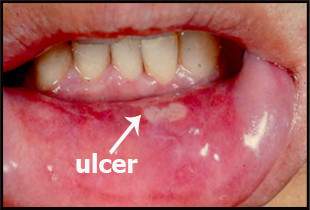

MedFriendly®


Ulcers
An ulcer is an open sore on the skin or on a mucous
membrane. A mucous membrane is one of four major
types of thin sheets of tissue that line or cover
various parts of the body, such as the mouth and
passages for breathing.
FEATURED BOOK: Why Zebras Don't Get Ulcers
WHAT ARE SOME OTHER CHARACTERISTICS
OF ULCERS?
A mouth ulcer (white).
Ulcers of the skin are most common in the leg. Leg ulcers are usually caused by poor
blood supply to the leg or poor drainage of blood from the leg. A more rare form of skin
"Where Medical Information is Easy to Understand"™
The destruction of tissue that leads to an ulcer accompanies certain infections,
inflammatory conditions, or cancers. Clear boundaries mark where an ulcer begins
and ends. An ulcer can be deep or shallow (not deep). Shallow ulcers only involve the
outer layer or layers of the skin. An ulcer is generally shaped like a crater and is
usually inflamed and painful. Pus, which is a yellow or green creamy substance that is
sometimes found at the site of infections, often forms in an ulcer.
WHAT CAUSES ULCERS?
Ulcers are caused by destruction of tissue on the surface of the skin or mucous
membranes.
WHERE DO ULCERS USUALLY OCCUR?

Ulcers that develop on mucous membranes are
most common in the digestive tract. Ulcers can
occur in the mouth and are known as canker sores.
Most mouth sores heal well without scarring.
Ulcers can also occur in the stomach, and the
intestine.The intestine is a tube-shaped structure
that is part of the digestive tract. It stretches from
an opening in the stomach to the anus (rear end)
and occupies most of the lower parts of the belly.
Sores in the mouth are common, painful, and
usually brought on by stress.

Ulcers can also develop in other places, such as on the cornea. The cornea is the clear covering at the
front of the eyeball. The skin or mucous membranes of the genitals (private parts) can also be affected by
ulcers and are usually caused by sexually transmitted diseases. Ulcers of the genitals are called
chancres (pronounced cankers).
WHAT OTHER WORDS ARE RELATED TO ULCERS?
Ulcerate and ulcerated means to form an ulcer or to become affected with an ulcer or as if one was
affected by an ulcer. Ulceration is the process of forming one or more ulcers. It can also refer to an ulcer
or group of ulcers. Ulcerative means relating to, characterized by, causing, or marked by the presence or
formation of one or more ulcers. Ulcerogenic means tending to produce or develop into one or more
ulcers.
WHAT ELSE IS AN ULCER KNOWN AS?
An ulcer is also known as an ulcus. More than one ulcer is known as ulcera.
WHAT IS THE ORIGIN OF THE WORD, ULCER?
Ulcer comes from the Latin word "ulcus" meaning "sore."














